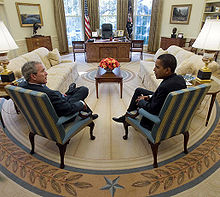 No President since FDR has ever been reelected with an unemployment rate above 7.2%. Period. However, the Bureau of Labor Statistics reported in August that the unemployment rate is 8.1%, about where it has been since the beginning of the year. What does this mean for November?
No President since FDR has ever been reelected with an unemployment rate above 7.2%. Period. However, the Bureau of Labor Statistics reported in August that the unemployment rate is 8.1%, about where it has been since the beginning of the year. What does this mean for November?
Fortunately for President Obama, the claims of 7.2% as a make-it-or-break-it, election-deciding economic indicator are dubious at best. As Aaron Blake of The Washington Post notes, “while it is true that no president since World War II has won with an unemployment rate above 7.2%, only two have tried.” And Carter and Bush Sr. had plenty of other factors weighing against them. Reagan won reelection with the rate at exactly 7.2%. In that case, one would expect a tight election that could break either way. As we know, Reagan didn’t just win; he did so with the largest Electoral College victory in history.
While a myopic focus on the unemployment rate tells us very little about the upcoming election, looking at the general direction of the economy and consumer sentiment can illuminate a lot. For marginal voters – citizens who vote based on who they think will most improve their lives, rather than voting by party – the economy is a key issue. How much these people weigh the well being of the economy on the unemployment rate, and how much they blame President Obama’s policies for that rate, will be a tremendous factor in who wins in November.
While we have officially left recession, many in the country are still reeling from the economic pain of the past few years. To deflect the complaints of the American people, the Obama administration and the Democratic Party have adopted an official line of blaming pre-Obama policies for the travails of the present. President Bush is the most common target.
Is the Bush criticism warranted? Absolutely. Does he deserve all of the blame? Of course not. While Bush presided over two wars and the expansion of a housing bubble, this nation rebounded marvelously from a turn-of-the-century slowdown under his tutelage. What President Bush began with the Stimulus Act and TARP, President Obama continued with ARRA and an automakers’ bailout. Bush deserves some of the blame, but not nearly all of it.
Yet across the country, Democratic surrogates continue to preach a message of immunity. As former President Clinton told an enthusiastic crowd of 2,000 Floridians, “I honestly believe it doesn’t matter who caused [the downturn] or whether the contributing factors all happened under President Bush or something I did or something Ronald Reagan did 30 years ago. Regardless, President Obama didn’t cause it.”
While the country did not fall into recession on Obama’s watch, Americans must still assess the President’s prescription for fixing the economy and decide whether it will be able to lift America back into prosperity in a second term.
So what does this tell us about how the election will turn out? Obama is not fully responsible for the state of the economy, yet as the president of the country he must take some responsibility, and many feel that he hasn’t delivered. Governor Romney’s campaign is hinged heavily on the fact that Obama has failed to lower unemployment to an acceptable rate. But the Obama campaign is slick, well run, and impeccably organized. Voters may blame Obama for high unemployment, but also believe the Democrats’ message that he is only partly at fault. 7.2% cannot tell us who will win in November, what can is the percentage of people who attribute it to the president.
